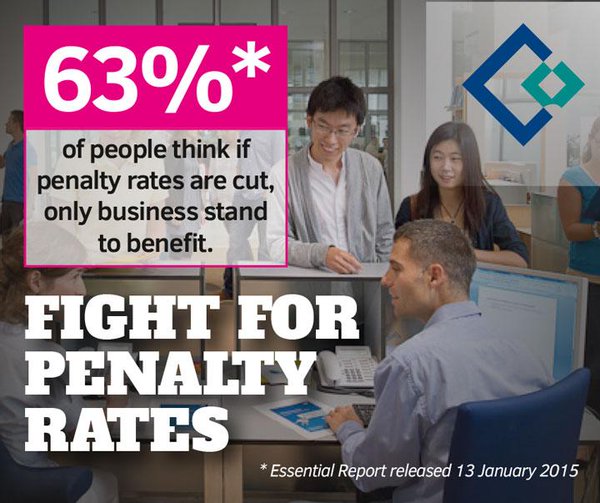
VANGUARD - Expressing the viewpoint of the Communist Party of Australia (Marxist-Leninist)
For National Independence and Socialism • www.cpaml.org
Ned K.
The Decision of the Fair Work Commission Full Bench to slash Sunday and Public Holiday pay rates of retail and hospitality workers is part of imperialism's attempt to increase profits from all sectors of the Australian working class.
The Decision has been handed down at a time when average annual wage increase in the private sector in the last year is 1.8%, continuing a downward trend.
The only sectors of the working class to win annual wage increases above 2.5% -3% (the enterprise agreement current average increases) are where workers are well organised and prepared to collective action to win their demands. The construction industry in large building projects is an example, despite the best attempts by the ruling class through the ABCC to weaken these workers’ collective strength.
It is no accident that imperialism's business associations in Australia have targeted the retail and hospitality industries for an attack on weekend and public holiday rates of pay. These sectors of the economy are two of the least organised sections of workers in Australia. In retail, the shop assistants union SDA has membership in large corporate entities like MacDonalds, Woolworths and Coles where weekend penalty rates had already been traded away by the SDA and where active membership is discouraged as long as the corporations facilitate union membership for the union.
Outside of these large corporations where the retail workers are paid only the award rate and sometimes not even that, there is little union membership and even fewer organised union members.
In hospitality, the situation is similar with little organizing resources allocated to the industry except in the easier targets like Casinos who employ hundreds of workers under the one roof. In most states attempts to organize hospitality workers in suburban hotels, tourist resorts and clubs where the majority of award based workers work, is minimal.
These sectors are characterized by high levels of casual employment with 65% of hospitality workers without leave entitlements and high turnover of labour with only a small minority of workers staying with the one employer long enough to accrue long service leave. The high turnover of labour and the small number of workers with an accrued entitlement of Long Service Leave is one of the hidden cost savings that employers in these sectors already enjoy. Cuts to weekend rates is the icing on the cake.
However the big agenda of imperialism is to increase the overall rate of exploitation of workers in Australia and to increase the share of GDP going to profits and decrease the share going to wages and salaries. The changing nature of the structure of the working class in Australia is being seized upon by imperialism to accelerate this share going to profits.
This recent Decision of the Full Bench of Fair Work Commission on weekend and public holiday rates highlights the significant change in the structure of the working class, where the sectors of the economy where the workers were strongest have been overtaken numerically speaking by sectors where workers are not nearly as well organized.
Pages 98 and 99 of the Decision contain tables with the changes in proportion of total employment by industry between 1975 and 2014.
In 1975, manufacturing employed 20% of workers in Australia and the services sector employed 50%. In 2014, manufacturing employed 6% of workers in Australia and the services sector just over 70%.
The services sector includes the following industries: Wholesale trade; Retail trade; Accommodation and food services; Financial and insurance services; Rental hiring and real estate services; Professional, scientific and technical services; Administrative and support services; Public Administration and safety; Education and training; Health Care and social assistance; Arts and recreation services.
Taken as a whole, the services sector with the exception of public sector health and education is not nearly as well organized to defend their wages and conditions, let alone improve them.
Many of the workers in the services sector do not see joining a union as the solution to their problems. There are many reasons for this way of thinking. It is overt attacks on living standards like the latest Fair Work Commission Decision that may be the catalyst to an upsurge in struggle by hundreds of thousands of workers in the services sector.
This may see existing unions rise to the challenge of meeting these workers’ aspirations and needs or it may see them bypassed by new forms of organization as the means by which they can defend and advance their material class interests.